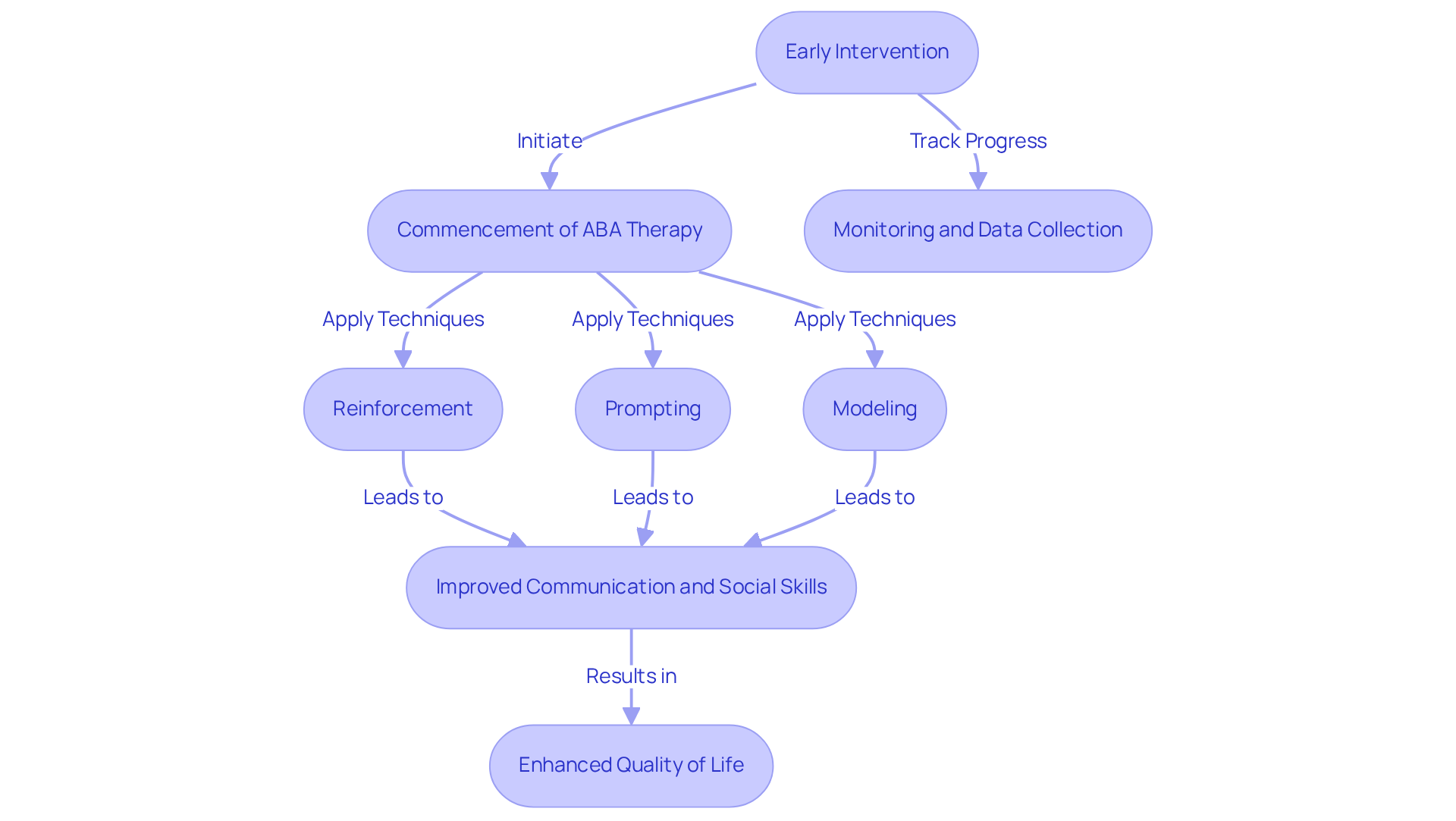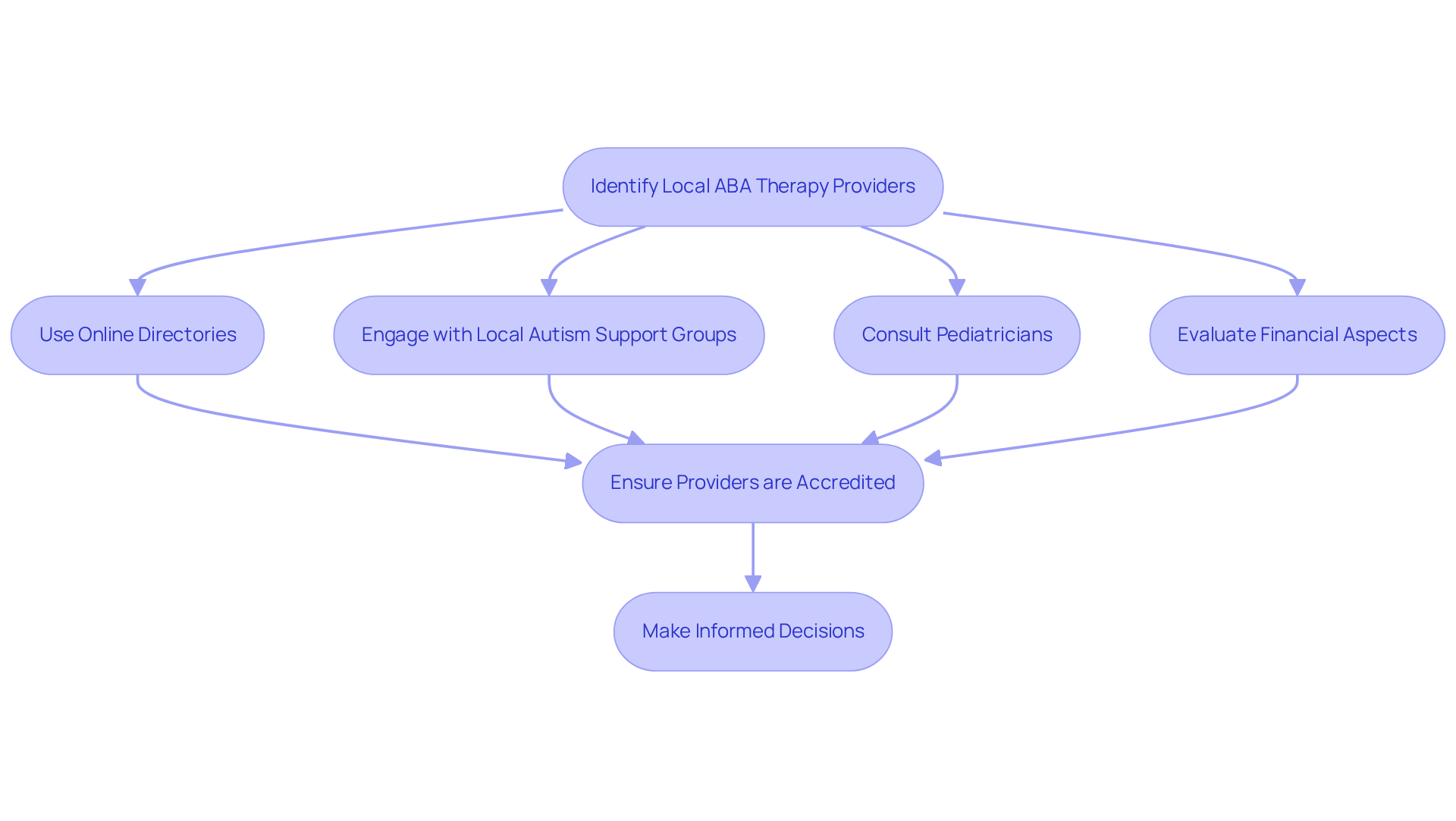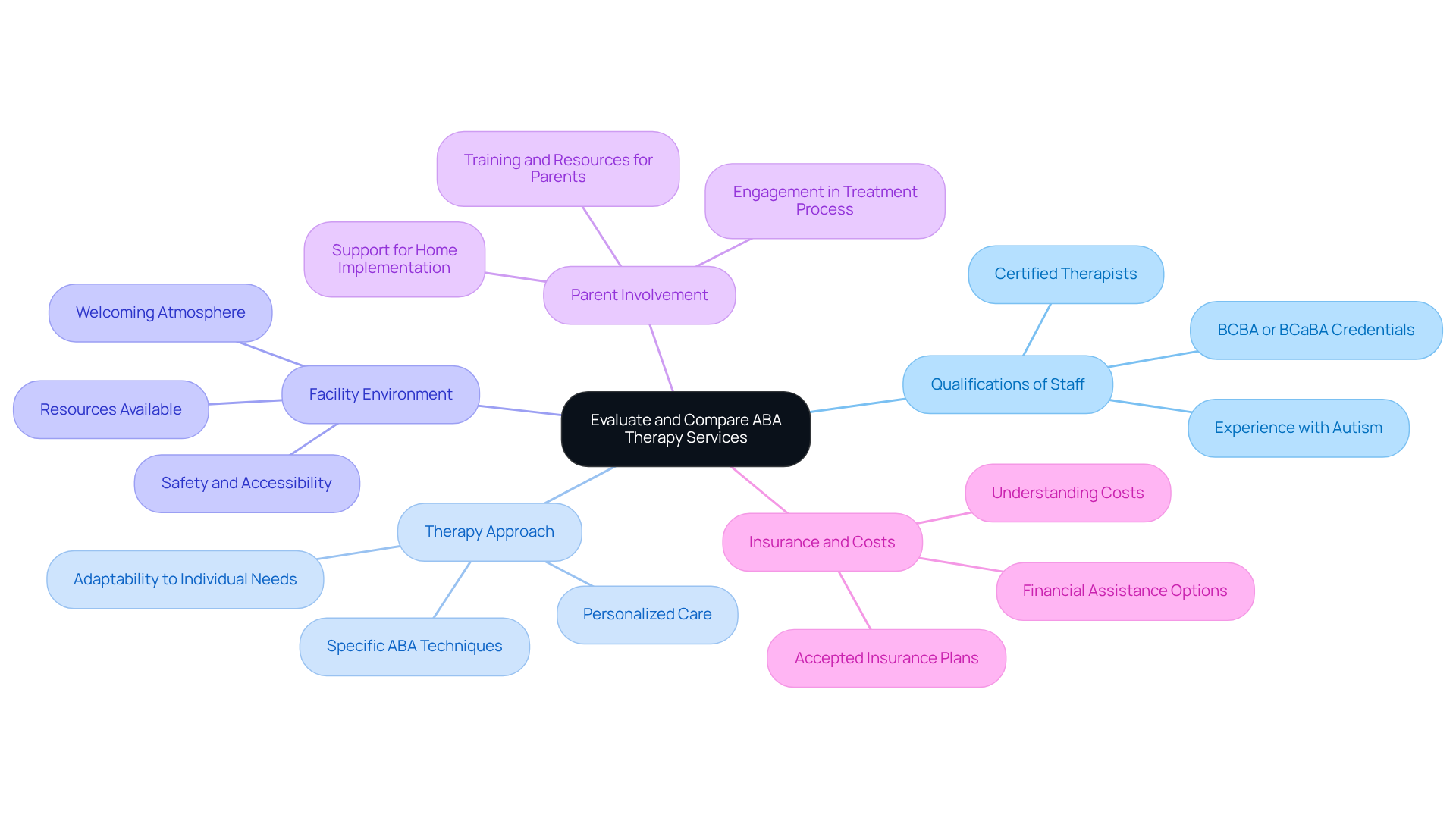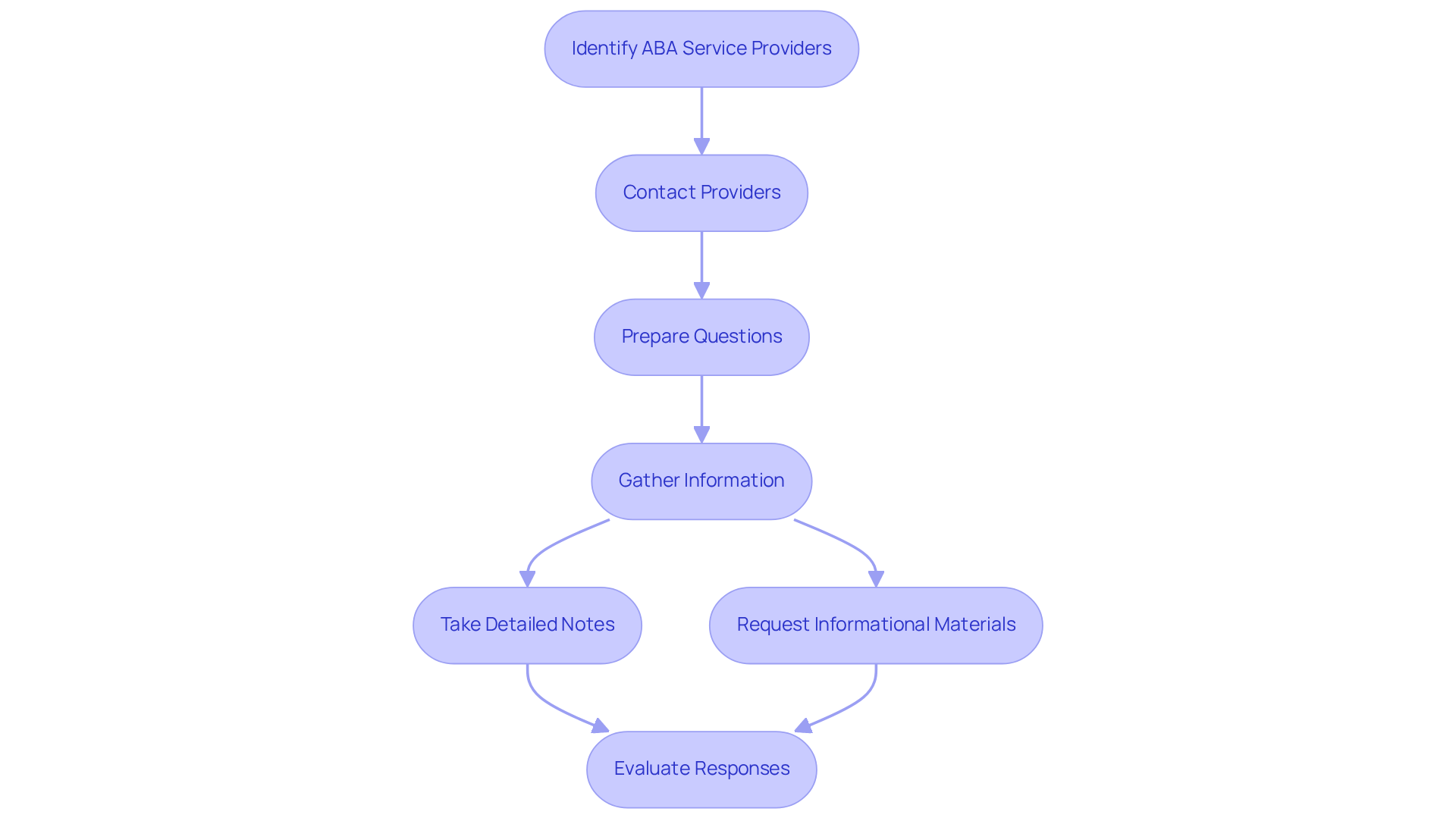September 29, 2025

Finding local ABA therapy for autism is crucial, especially when considering the significance of early intervention. Did you know that the demand for Board Certified Behavior Analysts (BCBAs) is at an all-time high? This underscores the need for qualified providers who can offer effective therapy options tailored to your child's unique needs. ABA therapy has proven to be particularly effective when initiated early, leading to better outcomes for children.
To locate accredited practitioners, it is essential to assess their qualifications, therapy approaches, and costs. What challenges are you currently facing in hiring the right professionals? By evaluating these critical factors, you can make informed decisions that will benefit your child in the long run.
Utilizing platforms like Hire ABA can simplify this process, connecting you with qualified providers who understand the nuances of ABA therapy. Remember, the right fit can make all the difference in your child's development. Take action today to ensure the best possible support for your family.
Navigating the world of autism therapy can be overwhelming, particularly when seeking the right support for a child. The demand for Board Certified Behavior Analysts (BCBAs) is on the rise, highlighting the critical need for effective interventions. ABA therapy, recognized for its effectiveness in enhancing communication and social skills, stands out as a vital intervention.
This guide offers a comprehensive roadmap for parents, detailing how to locate and evaluate local ABA therapy providers, ensuring that children receive the tailored care they need. With numerous options available, families may wonder: how can they discern which providers truly meet their child's unique needs? The right support is essential for fostering growth and development in children with autism, making informed choices more important than ever.
ABA therapy for autism near me is a scientifically validated method for understanding and improving behavior, particularly effective for children with autism. Early intervention is a cornerstone of this approach, significantly enhancing communication, social skills, and daily living abilities. Research reveals that children who commence ABA therapy before the age of two are three times more likely to thrive in inclusive educational settings compared to those who start later. Techniques such as reinforcement, prompting, and modeling are strategically employed to promote positive behaviors and reduce challenging ones.
The effects of early intervention are profound; studies indicate that children receiving intensive ABA therapy for autism near me—typically 25 to 40 hours per week—experience remarkable improvements across various skill domains. For example, a young individual named Ethan reduced his frustration and tantrums by 70% after just one year in an ABA-based early intervention program. Furthermore, longitudinal studies show that 50-75% of children who undergo intensive ABA therapy for autism near me for two or more years exhibit significant enhancements in cognitive and adaptive functioning.
Behavior analysts emphasize the critical nature of early intervention, noting that tailored strategies developed from precise data collected during sessions can enhance engagement and effectiveness. As one expert aptly stated, 'The earlier the intervention occurs, the more effective the treatment tends to be.' This highlights the importance for parents to recognize signs indicating the need for early intervention, such as delayed communication or limited social interaction. By seeking timely assistance, families can markedly improve their children's developmental progress and overall quality of life.

The demand for Board Certified Behavior Analysts (BCBAs) is rapidly increasing, with projections indicating a 22% rise in the need for ABA support services from 2018 to 2028. This trend is particularly evident in states like California and Texas, where finding qualified practitioners is essential.
To begin your search for practitioners offering ABA therapy for autism near me, utilize online directories and resources. Websites such as the BHCOE Accreditation Directory and LEARN Behavioral's location finder allow you to search for ABA therapy for autism near me by simply entering your city or ZIP code.
Engaging with local autism support groups or consulting your pediatrician can also yield valuable recommendations for reputable ABA therapy for autism near me. It is crucial to ensure that these providers are accredited and employ Board Certified Behavior Analysts (BCBAs), as this guarantees adherence to high standards of care. With studies indicating that up to 90% of young individuals on the autism spectrum achieve significant progress through ABA intervention, the importance of finding qualified providers cannot be overstated.
Additionally, consider the financial aspect of ABA treatment, which typically ranges from $120 to $200 per hour. Evaluating your budget is vital when exploring options. By taking these steps, you can ensure that your child receives the best possible care. Don't hesitate to leverage these resources and make informed decisions for your family’s needs.

When evaluating options for aba therapy for autism near me, it is crucial to consider several key criteria that can significantly impact your decision.
Qualifications of Staff: Are the therapists certified and experienced in working with children with autism? Look specifically for BCBAs or BCaBAs, as their qualifications are vital for effective therapy.
Therapy Approach: What specific ABA techniques do they employ? It's essential to inquire about how they tailor their approach to meet individual needs in aba therapy for autism near me, ensuring that each child receives personalized care.
Facility Environment: If possible, visit the center to assess the environment. A welcoming and conducive atmosphere is essential for effective learning and therapy.
Parent Involvement: How do they engage parents in the treatment process? Inquire whether they offer training or resources for home support, as parental involvement can enhance the effectiveness of therapy.
Insurance and Costs: Verify which insurance plans are accepted and understand the associated costs. This knowledge will help you make a financially informed decision.
By comparing these factors among various suppliers, you can make a more informed choice about finding aba therapy for autism near me. Reflect on your current hiring challenges and consider how these criteria can guide you in selecting the most suitable ABA therapy service.

Statistics reveal a pressing demand for ABA therapy for autism near me, as approximately 75% of caregivers are currently on a waitlist. This highlights the critical importance of understanding waitlist dynamics when selecting a provider. After identifying potential ABA service providers, the next step involves reaching out to gather essential information. Prepare a comprehensive list of questions to guide your initial conversations. Key inquiries should include:
Taking detailed notes during these discussions will allow for effective comparison of responses. Additionally, request any informational materials they may have, such as brochures or treatment plans, to further evaluate their services.
The initial assessment process is crucial, as it typically involves interviews, direct observations, and interactive sessions conducted by a Board Certified Behavior Analyst (BCBA). This thorough evaluation guides the creation of customized treatment plans designed for each individual’s unique strengths and needs, ensuring that therapy is both effective and relevant. Research indicates that 89% of children receiving intensive ABA treatment exhibit positive outcomes, reinforcing the importance of a comprehensive initial assessment. Understanding these elements will empower you to make informed decisions when selecting the right ABA therapy for autism near me.

Finding the right ABA therapy for autism is a crucial step in supporting children with developmental challenges. Understanding the significance of early intervention and the structured methodologies of ABA therapy empowers families to take proactive measures that enhance their child's communication, social skills, and overall quality of life. Recognizing the need for specialized care and acting swiftly is imperative to secure the best possible outcomes.
This article outlines a comprehensive approach to locating local ABA therapy providers. It emphasizes the importance of:
Key factors, such as the therapist's credentials, therapy techniques, and the environment of the facility, play a vital role in ensuring effective treatment. Additionally, understanding the financial aspects and preparing pertinent questions can empower families to make informed choices.
Ultimately, the search for ABA therapy services transcends merely finding a provider; it’s about securing a brighter future for children on the autism spectrum. By prioritizing early intervention and taking these steps, families can significantly improve their children's chances of thriving in various aspects of life. It is essential to act now and leverage available resources to ensure that every child receives the quality support they deserve.
What is ABA therapy and its significance for autism?
ABA therapy, or Applied Behavior Analysis therapy, is a scientifically validated method designed to understand and improve behavior, particularly effective for children with autism. It focuses on early intervention to enhance communication, social skills, and daily living abilities.
Why is early intervention important in ABA therapy?
Early intervention is crucial as research shows that children who begin ABA therapy before the age of two are three times more likely to thrive in inclusive educational settings than those who start later.
What techniques are used in ABA therapy?
Techniques used in ABA therapy include reinforcement, prompting, and modeling, which are strategically employed to promote positive behaviors and reduce challenging ones.
What are the expected outcomes of intensive ABA therapy?
Children receiving intensive ABA therapy, typically 25 to 40 hours per week, experience significant improvements across various skill domains. For instance, a child named Ethan reduced his frustration and tantrums by 70% after one year in an ABA-based early intervention program.
What percentage of children benefit from intensive ABA therapy over time?
Longitudinal studies indicate that 50-75% of children who undergo intensive ABA therapy for two or more years show significant enhancements in cognitive and adaptive functioning.
How do behavior analysts view the importance of early intervention?
Behavior analysts emphasize that early intervention is critical, as tailored strategies developed from precise data collected during sessions can enhance engagement and effectiveness.
What signs should parents look for that indicate the need for early intervention?
Parents should recognize signs such as delayed communication or limited social interaction, which may indicate the need for early intervention to improve their child's developmental progress and overall quality of life.
Our expert recruitment strategies and AI-driven sourcing ensure that you receive top-notch candidates quickly, without compromising on quality. Whether you’re looking for BCBAs, Clinical Directors, or RBTs, we’ve got you covered.